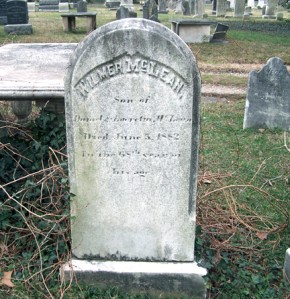The American Civil War and a Coincidence June 19, 2010
Author: Beach Combing | in : Modern , trackback
Beachcombing has never really got his head around coincidences. So can it really be a ‘coincidence’ that he shares a birthday with another sixteen million human beings? Is it just dumb ‘luck’ that he has the same middle name as his wife’s American cousin? And is it mere ‘fluke’ that he received three emails this morning from three different confidence tricksters whose names all ended with the letter ‘n’?
Well, the answer is clearly: yes, yes and yes… Weak-minded humans – and Beachcombing is proud to belong – are forever choosing to fill such chance events with unjustified significance. However, Beachcombing would also insist that sometimes these ‘coincidences’ have a wild and lovely beauty to them. Enter Wilmer Mclean…
McLean (1818-1882) was a Virginian farmer and merchant who had the great misfortune to have his farm near Bull Run where, in 1861, the first great battle of the American Civil War took place. In fact, McLean was so close to the action that his house was briefly taken over by the Confederate general Beauregard, who used it as his headquarters: and one of the first Union cannonades went crashing into Wilmer’s kitchen destroying the general’s dinner.
McLean soon after took his family away – wisely given that the territory around Bull Run would continue to be contested. He moved, in fact, to peaceful Appomattox county in the south of the state of Virginia. And at this point anyone who knows anything about the US Civil War will see where the story is going…
Fast forward four years and in April 1865 the last full-blown battle of the Civil War was fought virtually outside McLean’s new front door, with the weakened Confederate army being beaten into submission. Enter Wilmer again. Colonel Charles Marshall, one of Lee’s staff, grabbed the ‘veteran’ of Bull Run as McLean walked down the street and asked to use his house for the signing of the surrender.
McLean foolishly agreed. ‘Foolishly’ because his home was subsequently ransacked by Union souvenir hunters who took anything that they could carry: McLean’s table, for example, ended up in the grubby hands of a Major General George Custer.
And McLean’s consolation? He got to give one of the best lines in all American history: ‘the war began in my front yard and ended in my front parlour’. Though Beachcombing doubts that Lee or Grant were listening…
Beachcombing loves Wilmer’s story but has been disappointed by how difficult the facts are to verify. There is no question that the outline given here is correct – this is not an urban legend – but the final quotation comes in (admittedly slightly) different versions. Beachcombing would also like to know whether the kitchen-wrecking cannonade at Bull Run really was one of the first or even the first of the battle (as some accounts claim). drbeachcombingATyahooDOTcom
Beachcombing should also note that there is a Biography of Wilmer McLean written by Frank Cauble (Virginia 1987), but at 40 odd dollars by post to the UK Beachcombing will not be reading it any time soon. It is not even in his British copyright library of choice.
Yes, he loves the story but not that much…



